牛津译林版八年级上册第五单元知识点
Unit5重要知识点整理牛津译林版英语八年级上册

1.wild adj.野生的Something bit Andy. But he wasn't sure if it was a __________ (野生的) animal.翻译:事实上, 在野外工作并不像我们想象的那么好。
____________________________________________________________________ ____________2.die v.死n.___death_______过去式:died辨析:dead & dyingThe cat is dead. 这只猫已经死了。
The cat is dying. 这只猫奄奄一息。
This man ___________ (死)of cancer (癌症) because he smoked too much.3.dish n.菜肴翻译:野生动物应该是自由快乐的, 而不是变成盘中餐。
____________________________________________________________________ ____________4.pity n.同情词组:同情某人have a pity on sb.What a pity! 多么遗憾啊!注意:同义词:What a shame!(1)I don't want your ___________. What I need most is respect (尊重) .(2)Please have pity _________ these young people. They e far away and nothing to eat.B.toC.at翻译:请同情同情他吧! 没有你的帮助他可能会死的。
______________________________________________Please have/take pity on him! He may die without your help.5.free adj. 自由的;空闲的be free to do sth.(1)You are f___________ too e and go as you like.(2)I'm free next week. You can e at __________.time time time6. rare adj. 罕见的;稀有的Look at the bird over there! It's so beautiful!—Wow! It's a rare crane. It __________ appears (出现) in this area.7.Could you please do sth.?Could you please not do sth.?Could you please __________ (not use) your mobile phone at the gas station? It's very dangerous.翻译句子:野生动物应该是自由快乐的, 而不是变成盘中餐。
牛津译林版八年级上册第五单元知识点

8A Unit 5 知识点1. Would you like to live in the wild,Eddie?1)would like to do sth.=want to do sth.但语气更加委婉2)wild adj.野生的/n.自然环境wild life/animals 野外生活/野生动物wildly adv.in the wild处于野生状态The children are wild with joy.欣喜若狂Fewer than a thousand giant pandas still live in the wild.翻译:花园里长了一些野花。
2. Please have pity on them.1)please可引导祈使句,后面加动词原形2)pity n.怜悯;同情;遗憾;可惜(have/take pity on)v.同情;怜悯The old lady often takes pity on small animals.那位老太太常常怜悯小动物。
I pity anyone who has to feed a family on such a low income.我同情任何需要以如此微薄的收入养活全家的人。
It's a pity that you can't come to the party.你不能来参加这次聚会,真可惜。
What a pity!真遗憾,可惜!3. I may die without them.1)die v.die out 消失; 灭绝; 逐渐消失; 灭亡die off 死去; 相继死去die of(内因)/from(外因)死于.. be dying for 渴望Sadly, both he and my mother died of cancer.I'm dying for a breath of fresh air.2)dead adj.死了的death n.死亡dying垂死的Car accidents caused many deaths.车祸造成很多人死亡。
牛津译林版八年级英语上册Unit5知识点复习及练习

牛津译林版八年级英语上册Unit5知识点复习及练习一、Unit5重点单词1.free 自由的adj.,freedom 自由n.2.have /take pity on sb. 同情某人We should have pity on the weak. 对病人,我们应该要有同情心。
3.(die死,v. ) (dying垂死的,adj.) (dead,死的,adj.) (death,死,n.)4.be born 出生I was born in 1976. 我出生于1976年。
5.in the beginning,at the beginning of , 一开始6. live on 以食...为生,Vampires live on blood.吸血鬼以吸血为生。
7.(danger 危险n.)(dangerous 危险的,adj.)in danger 处境危险8.action 行为,行动,n. take action 采取行动9.right away 立刻,at once 马上10. none 没有一个(人或物)否定回答,表示什么也没有11.at birth 出生时,诞生时12.get lost 迷路at a lose 迷茫13.the same ...as 与... 一样She has the same book as you.二、课文分析1. Why not? Wild animals are free and happy.(1) Why not?表示赞同别人的建议,相当于Good idea! I think so.等。
(2) free意为“免费的;自由的”。
作“自由的”讲时,-- freer--freest,其反义词是busy; be busy doing sth.作“免费的”讲时,没有比较级和最高级形式,常用短语为for free(免费地)。
be free to do sth.意为“自由地做某事”。
牛津译林版英语八年级英语上册 Unit5知识点梳理
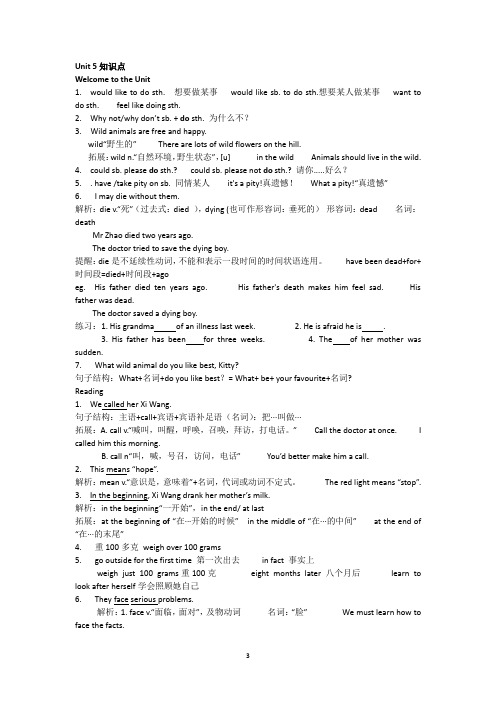
Unit 5知识点Welcome to the Unit1.would like to do sth. 想要做某事would like sb. to do sth.想要某人做某事want to do sth. feel like doing sth.2.Why not/why don’t sb. + do sth. 为什么不?3. Wild animals are free and happy.wild“野生的” There are lots of wild flowers on the hill.拓展:wild n.“自然环境,野生状态”,[u] in the wild Animals should live in the wild.4. could sb. please do sth.? could sb. please not do sth.? 请你.....好么?5. . have /take pity on sb. 同情某人it's a pity!真遗憾!What a pity!“真遗憾”6. I may die without them.解析:die v.“死”(过去式:died ),dying (也可作形容词:垂死的)形容词:dead 名词:deathMr Zhao died two years ago.The doctor tried to save the dying boy.提醒:die是不延续性动词,不能和表示一段时间的时间状语连用。
have been dead+for+时间段=died+时间段+agoeg. His father died ten years ago. His father's death makes him feel sad. His father was dead.The doctor saved a dying boy.练习:1. His grandma of an illness last week. 2. He is afraid he is .3. His father has been for three weeks.4. The of her mother was sudden.7. What wild animal do you like best, Kitty?句子结构:What+名词+do you like best?= What+ be+ your favourite+名词?Reading1.We called her Xi Wang.句子结构:主语+call+宾语+宾语补足语(名词):把···叫做···拓展:A. call v.“喊叫,叫醒,呼唤,召唤,拜访,打电话。
牛津译林版英语八年级上册Unit 5 Wild animals 知识讲义-重点句型
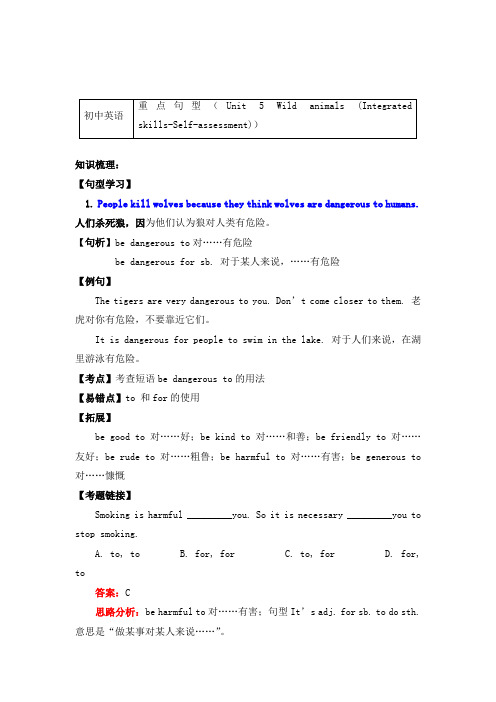
知识梳理:【句型学习】1. People kill wolves because they think wolves are dangerous to humans.人们杀死狼,因为他们认为狼对人类有危险。
【句析】be dangerous to对……有危险be dangerous for sb. 对于某人来说,……有危险【例句】The tigers are very dangerous to you. Don’t come closer to them. 老虎对你有危险,不要靠近它们。
It is dangerous for people to swim in the lake. 对于人们来说,在湖里游泳有危险。
【考点】考查短语be dangerous to的用法【易错点】to 和for的使用【拓展】be good to 对……好;be kind to 对……和善;be friendly to对……友好;be rude to 对……粗鲁;be harmful to对……有害;be generous to 对……慷慨【考题链接】Smoking is harmful _________you. So it is necessary _________you to stop smoking.A. to, toB. for, forC. to, forD. for, to答案:C思路分析:be harmful to对……有害;句型It’s adj. for sb. to do sth.意思是“做某事对某人来说……”。
2. Sadly, they have fewer and fewer living areas.令人伤心的是,它们生活的区域越来越少。
【句析】这里的fewer and fewer是形容词比较级的并列连接,表示“越来越……”【例句】There are fewer and fewer tigers in the world.=The number of tigers in the world is becoming smaller and smaller.世界上老虎的数量越来越少。
牛津译林版八年级英语上册unit5-8知识点讲解
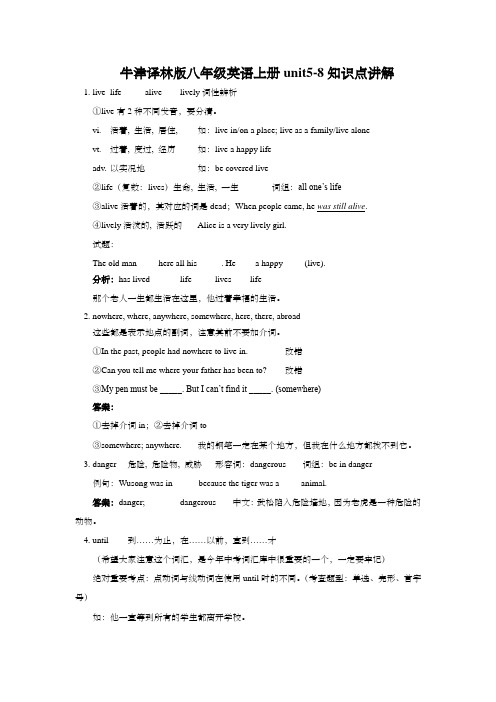
牛津译林版八年级英语上册unit5-8知识点讲解1. live life alive lively词性辨析①live有2种不同发音,要分清。
vi. 活着, 生活, 居住, 如:live in/on a place; live as a family/live alonevt. 过着, 度过, 经历如:live a happy lifeadv. 以实况地如:be covered live②life(复数:lives)生命, 生活, 一生词组:all one’s life③alive活着的,其对应的词是dead;When people came, he was still alive.④lively活泼的, 活跃的Alice is a very lively girl.试题:The old man ____ here all his _____. He____ a happy ____ (live).分析:has lived life lives life那个老人一生都生活在这里,他过着幸福的生活。
2. nowhere, where, anywhere, somewhere, here, there, abroad这些都是表示地点的副词,注意其前不要加介词。
①In the past, people had nowhere to live in. 改错②Can you tell me where your father has been to? 改错③My pen must be _____. But I can’t find it _____. (somewhere)答案:①去掉介词in;②去掉介词to③somewhere; anywhere. 我的钢笔一定在某个地方,但我在什么地方都找不到它。
3. danger 危险, 危险物, 威胁形容词:dangerous 词组:be in danger例句:Wusong was in _____ because the tiger was a ____ animal.答案:danger; dangerous 中文:武松陷入危险境地,因为老虎是一种危险的动物。
牛津译林版八年级英语上册unit5单元知识点归纳
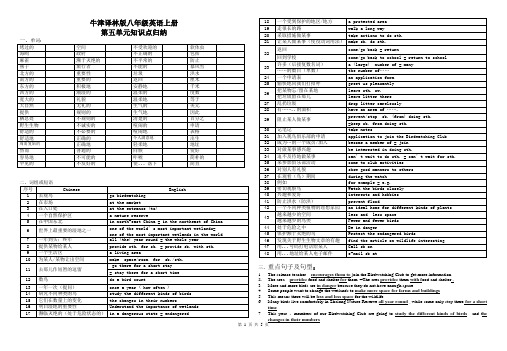
牛津译林版八年级英语上册第五单元知识点归纳三、重点句子及句型:1.The science teacher encourages them to join the Birdwatching Club to get more information.2.The area provide s food and shelter for them..=The area provide s them with f ood and shelter .3.More and more birds are in danger because they do not have enough space.4.Some people want to change the wetlands to make more space for farms and buildings.5.This means there will be less and less space for the wildlife.6.Many birds live comfortably in Zhalong Nature Reserve all year round , while some only stay there for a shorttime.7.This year ,members of our Birdwatching Club are going to study the different kinds of birds and t hechanges in their numbers.8.We hope this information will help them understand and make them actively take actions to protect wildlife.9.We need more people to help us count and do something to help the birds .10.Studying Zhalong helps us learn about protecting wildlife.11.The sun shone brightly as we got on the school bus .12.He also told us to walk softly and not to frighten the birds .13.It has an area of more than 210,000 hectares. = It is over 210,000 hectares in area.14.Zhalong is the home of a lot of plants and animals, including different kinds of birds.15.I think it is important for me to do something to protect birds.16.It is important for you to write your reports clearly .17.I will be very happy if I can become a member of your club .18.You can call me on 010-5558 6390 or e-mail me at********************.cn.19.They simply can’t wait for the party next week.1.科学老师们鼓励他们加入鸡鸟俱乐部来了解更多关于鸟的信息中心2.这个地区为他们提供食物和栖息地。
牛津译林版八年级英语上册Unit5单元知识点背诵讲义

牛津译林版八年级英语上册8A Uni t5背诵讲义一、单词ad j. n. n.diemeanface gian t pandazebral awsaveca tchlose5.法律,法规6.生存,生计23.失去,被……夺去;输掉vt.ki l lac taccep tm ovef ree29.自由的,不受束缚的adj.c losedlos t insec tdayt imewhi lesor ryth icknone adv.二、英文释义1. be born---come i nto the wor ld as a baby2.in the beg inn ing---a t f i r s t 4. main ly---more t han any th ing e l se5.t ake ac t ion--- do someth ing6. none--- no t any3.se r ious---bad o r dangerous三、短语1.生活在野外2.同情某人l ive in the wi ld have/take p i ty on s b3.事实上in fac t4.最爱……l ike… bes t/ mos t5.动物世界的王者6.关于……的报告7.称呼某人……8.看起来像一只小白鼠9.在四个月大的时候10.第一次外出11.不再……the k ing o f the an i mal wor lda repor t on s th/sbca l l sb s thlook l ike a whi te mousea t four months o ld= when sb be four m onths o ld go ou t fo r the f i r s t t imenot… any more(l onger) = no more(longer)in the beg inn ing/a t the beg inn ing o fface se r ious p rob lems12.起初13.面临严重的问题14. 主要依赖一种特殊的竹子生存 15. 变得越来越小 l ive main ly on a spec ia l k ind o f bamboo become smal le r and smal le r as a resu l t (o f … ) 16. 结果 ,因此 17. 有住的地方have a p lace to l ive 18. 处于困境/脱离困境 19. 采取行动做某事 20. 立刻,马上in danger / ou t o f danger t ake ac t ion(s ) to do s th r igh t away / r igh t now21. 帮助熊猫繁殖更多的宝宝 22. 建立更多的熊猫保护区 23. 制定法律保护熊猫 24. 采取措施 he lp pandas have m ore bab ies bui ld more panda r eserves make l aws to p ro tec t pandas do someth ing 不采取措施 . do no th ing 25. 有志者,事竟成。
牛津译林版八年级英语上册 Unit5 知识归纳

牛津译林版八年级英语上册8A Unit5 知识梳理一、重点单词1.leaf—leaves{树叶}2. follow—following{以下的}3.protection—protect{保护}4. encourage—encouragement{鼓励}5.write—writer{作者}6. wolf—wolves{狼}7.till—until{直到…为止} 8.hunt—hunter{猎人}9.lose—loss{丧失} 10.peace—peaceful{和平的}11.mouse—mice{老鼠} nd—farmland{农田}13.farm—farmer{农民} 14.act—action{行动}15.sad—sadly{可惜,令人伤心的} 16.training—train{训练}应注意的词:delicious{美味的} thirsty{口渴的}continue{继续} thick{厚的} medicine{药}二、重点短语1.weigh only 100 grams只重100 克2.survive in the wild在野外生存3.grow into a healthy giant panda长成一只健康的熊猫4.in the future在将来5.kill wild animals for their fur杀野生动物为了它们的皮毛6.have nowhere to live没地方可住7.be in danger在危险之中8.take them away把它们带走9.take the following actions采取以下行动10.build more reserves建造更多的自然保护区11.cut down trees and forests砍伐树和森林12.not … any more不再……13.protect wild animals保护野生动物14.see the feeding of animals看到动物的喂养15.attack people袭击人16.arrive at /in get to reach到达17.go hunting去打猎18.look delicious看起来美味19.take care of照顾20.know more about sth.更多的了解某物21.ask sb to do sth请某人做某事22.the Wild Animals Club野生动物俱乐部23.write a report about sth写一个关于某物的报告24.like least最不喜欢25.look like…看起来像……26.only 10 months old只有十个月大27.at 4 months在四个月的时候28.start to study开始上学29.at the beginning在一开始时30.up to 14 hours a day长达一天14 小时31.leave sth保留某物32.by oneself独自33.catch a giant panda捕获一头大熊猫34.be good at/do well in擅长于做某事35.make medicine制药36.the loss of…… 的损失37.live as a family像一家人一样生活38.be friendly to/towards each other彼此之间很友好39.spend some time doing sth花一些时间做某时40.get smaller and smaller变得越来越小41.become farmlands变成可耕地42.就某事给报刊杂志写信write to newspaper and magazines about sth三、重点语句1.At the very beginning, Xiwang drank her mother’s milk for up to 14 hours a day.(page60,lines11——12)一开始,“希望”每天长达14小时都在喝母亲的奶。
牛津译林版八年级英语上册Unit5知识点总结
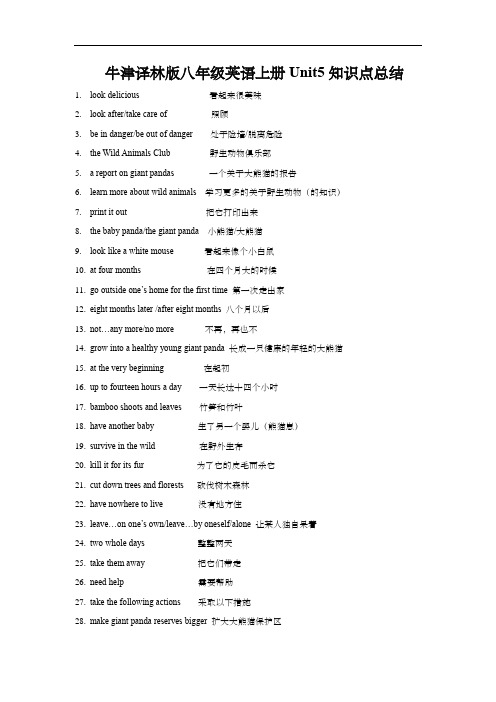
牛津译林版八年级英语上册Unit5知识点总结1.look delicious 看起来很美味2.look after/take care of 照顾3.be in danger/be out of danger 处于险境/脱离危险4.the Wild Animals Club 野生动物俱乐部5. a report on giant pandas 一个关于大熊猫的报告6.learn more about wild animals 学习更多的关于野生动物(的知识)7.print it out 把它打印出来8.the baby panda/the giant panda 小熊猫/大熊猫9.look like a white mouse 看起来像个小白鼠10.at four months 在四个月大的时候11.go outside one’s home for the first time 第一次走出家12.eight months later /after eight months 八个月以后13.not…any more/no more 不再,再也不14.grow into a healthy young giant panda 长成一只健康的年轻的大熊猫15.at the very beginning 在起初16.up to fourteen hours a day 一天长达十四个小时17.bamboo shoots and leaves 竹笋和竹叶18.have another baby 生了另一个婴儿(熊猫崽)19.survive in the wild 在野外生存20.kill it for its fur 为了它的皮毛而杀它21.cut down trees and florests 砍伐树木森林22.have nowhere to live 没有地方住23.leave…on one’s own/leave…by oneself/alone 让某人独自呆着24.two whole days 整整两天25.take them away 把它们带走26.need help 需要帮助27.take the following actions 采取以下措施28.make giant panda reserves bigger 扩大大熊猫保护区29.build more reserves 建立更多的保护区30.encourage me to work hard 鼓励我努力学习31.keep someone/something safe from danger 使某人/某物远离危险保持安全32.thick hair of animals 动物浓密的毛发rge areas of land with trees 有树的大片的土地34.stay alive 存活35.be/become interested in animals 变得对动物感兴趣36.grow more bamboo 种植更多的竹子37.see a snake in front of me 看到一条蛇在我前面38.North Africa/South Africa 北非/南非39.next weekend 下个周末40.run the other way 调头就跑41.walk through a rainforest 穿过热带雨林42.arrive there at noon 中午到达那儿43.see the feeding of animals 看给动物喂食44.watch the animals carefully 仔细观察动物45.get enough information for my class report 为我的班级报告取得足够的信息46.attack people 攻击人47.catch fish from the water 从水里抓鱼48.step on snakes 踩在蛇的身上49.spit poison 吐出毒液50.male/female wolves 公/母狼51.hunt for their own food 寻找他们自己的食物52.live as a family 群居53.learn how to catch other animals 学怎样抓捕其它动物54.live in family groups 群居55.live alone 独自一人居住56.be good at hunting other animals 擅于捕获其它动物57.bright eyes 明亮的眼睛58.yellow fur 黄色的毛皮59.black stripes 黑色的条纹60.be friendly towards/to each other 对彼此很友好61.loss of living areas 居住地区的丧失62.work as a team 团队合作63.make medicine from their bones 用它们的骨头制药64.clothes made of animal fur 用动物毛皮做的衣服65.look lovely on me 穿在我身上很好看66.lose one’s life 丢了某人的命67.someone else’s bike 其他某人的自行车68.give them good forest areas 给它们丰富的森林区域69.continue to build roads 继续筑路70.have suitable homes 有合适的家园71.get enough food 获得足够的食物72.sell elephants’ tusks 出售象牙73.beautiful black and white animals 漂亮的黑白相间的动物74.have only one or two babies at a time 一次生一到两个小孩75.get smaller and smaller 变得越来越小76.keep taking the land 继续占用土地77.write to newspapers and magazines 写信给报刊杂志78.take action(s) 采取措施79.walk upright 直立80.like to move around in the daytime 喜欢白天四处活动81.sharp paws 锋利的爪子82.see a dolphin show 看海豚表演83.feel frightened 感到害怕84.most people 大多数人Sentences:1.If you eat my food , I won’t talk to you. 如果你吃我的食物,我就不和你讲话。
牛津译林英语八年级上册unit5单元知识总结
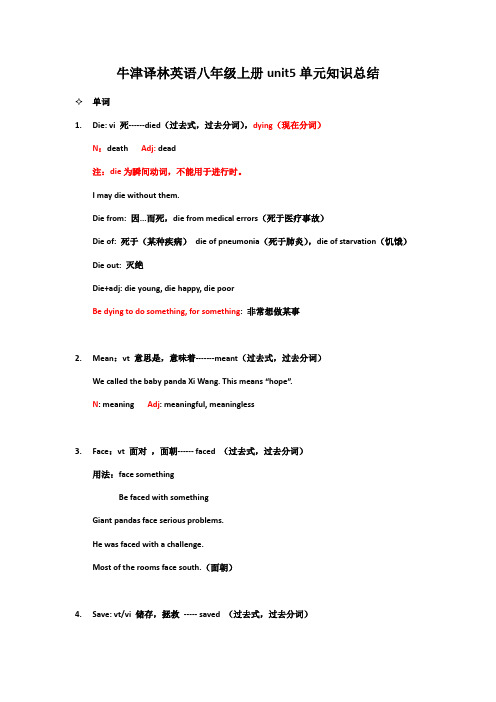
牛津译林英语八年级上册unit5单元知识总结单词1.Die: vi 死------died(过去式,过去分词),dying(现在分词)N:death Adj: dead注:die为瞬间动词,不能用于进行时。
I may die without them.Die from: 因...而死,die from medical errors(死于医疗事故)Die of: 死于(某种疾病)die of pneumonia(死于肺炎),die of starvation(饥饿)Die out: 灭绝Die+adj: die young, die happy, die poorBe dying to do something, for something: 非常想做某事2.Mean:vt 意思是,意味着-------meant(过去式,过去分词)We called the baby panda Xi Wang. This means “hope”.N: meaning Adj: meaningful, meaningless3.Face:vt 面对,面朝------ faced (过去式,过去分词)用法:face somethingBe faced with somethingGiant pandas face serious problems.He was faced with a challenge.Most of the rooms face south.(面朝)4.Save: vt/vi 储存,拯救----- saved (过去式,过去分词)They always begin to save some food before winter comes.(储存)He managed to save enough money to by an apartment. (存钱)A new treatment can save his life.(拯救,挽救)N:safety 安全5.Catch:vt 捉住,赶上-------caught(过去式,过去分词)Hunters catch tigers for their fur, bones or other parts of the body.He got up early in order to catch the early bus. 他早起就是为了赶早班车。
牛津译林版英语八年级英语上册 Unit5知识点梳理

Unit 5知识点Welcome to the Unit1.would like to do sth. 想要做某事would like sb. to do sth.想要某人做某事want to do sth. feel like doing sth.2.Why not/why don’t sb. + do sth. 为什么不?3. Wild animals are free and happy.wild“野生的” There are lots of wild flowers on the hill.拓展:wild n.“自然环境,野生状态”,[u] in the wild Animals should live in the wild.4. could sb. please do sth.? could sb. please not do sth.? 请你.....好么?5. . have /take pity on sb. 同情某人it's a pity!真遗憾!What a pity!“真遗憾”6. I may die without them.解析:die v.“死”(过去式:died ),dying (也可作形容词:垂死的)形容词:dead 名词:deathMr Zhao died two years ago.The doctor tried to save the dying boy.提醒:die是不延续性动词,不能和表示一段时间的时间状语连用。
have been dead+for+时间段=died+时间段+agoeg. His father died ten years ago. His father's death makes him feel sad. His father was dead.The doctor saved a dying boy.练习:1. His grandma of an illness last week. 2. He is afraid he is .3. His father has been for three weeks.4. The of her mother was sudden.7. What wild animal do you like best, Kitty?句子结构:What+名词+do you like best?= What+ be+ your favourite+名词?Reading1.We called her Xi Wang.句子结构:主语+call+宾语+宾语补足语(名词):把···叫做···拓展:A. call v.“喊叫,叫醒,呼唤,召唤,拜访,打电话。
牛津译林版8上Unit 5单词知识点

牛津译林版8上Unit 5单词知识点1. wild adj野生的wild animals n.自然环境,野生状态live in the wild (区分wide宽的)2. free adj自由的,不受束缚的I want to be as free as a bird. be free to do sth.=do sth. freely免费的do sth. for free There is no free dinner.空闲的He is not(bot be) free today. He won’t be(not be) free this weekend.free-freer-freest3. dish n.一道菜;盘,碟dishes4. no way不可能5. pity n.同情have/ take pity on him/her同情,怜悯vt.对...感到可怜I will pity you if you can’t answer such a question.如果你不能回答这样一个问题,我可怜你。
遗憾,可惜What a pity! It’s a pity that... (复数pities)6.die v.死died He died two years ago.(强调两年前死亡的动作)adj. dead The dog is dead.(强调死亡的状态)dying垂死的Look at the dying dog!The dog is dying.n. death His death made us sad.他的死使我们很伤心。
7.in fact事实上,实际上(常作插入语,放于句子开头)8.mean v.意思是,意味着,过去式meant meaning(s) 意思n.meaningful adj.有意义的/ meaningless没有意义的what does...mean? = What’s the meaning of...?9.be born出生,出世When were you born? I was born on February 26.Her baby will be born(bear) in two weeks.两周后她的宝宝将出生。
牛津译林版八年级英语上册重要知识点 unit5 wild animals
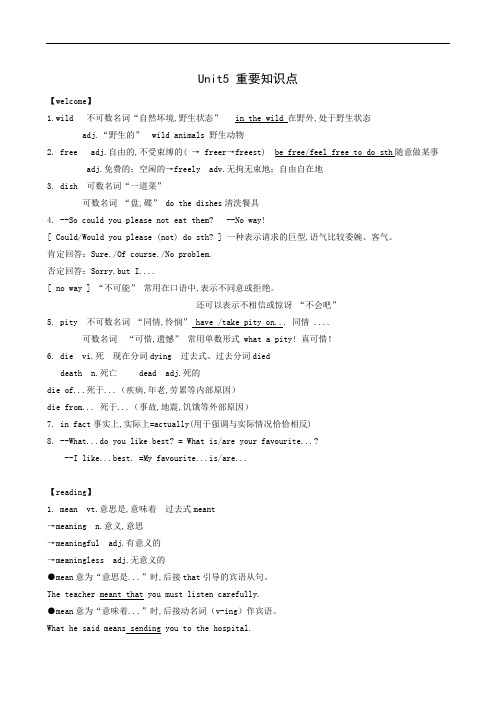
Unit5 重要知识点【welcome】1.wild 不可数名词“自然坏境,野生状态” in the wild 在野外,处于野生状态adj.“野生的” wild animals 野生动物2.free adj.自由的,不受束缚的( → freer→freest) be free/feel free to do sth随意做某事 adj.免费的;空闲的→freely adv.无拘无束地;自由自在地3.dish 可数名词“一道菜”可数名词“盘,碟” do the dishes清洗餐具4.--So could you please not eat them? --No way![ Could/Would you please (not) do sth? ] 一种表示请求的巨型,语气比较委婉、客气。
肯定回答:Sure./Of course./No problem.否定回答:Sorry,but I....[ no way ] “不可能”常用在口语中,表示不同意或拒绝。
还可以表示不相信或惊讶“不会吧”5.pity 不可数名词“同情,怜悯” have /take pity on... 同情 ....可数名词“可惜,遗憾”常用单数形式 what a pity! 真可惜!6.die vi.死现在分词dying 过去式、过去分词dieddeath n.死亡 dead adj.死的die of...死于...(疾病,年老,劳累等内部原因)die from... 死于...(事故,地震,饥饿等外部原因)7.in fact事实上,实际上=actually(用于强调与实际情况恰恰相反)8.--What...do you like best? = What is/are your favourite...?--I like...best. =My favourite...is/are...【reading】1.mean vt.意思是,意味着过去式meant→meaning n.意义,意思→meaningful adj.有意义的→meaningless adj.无意义的●mean意为“意思是...”时,后接that引导的宾语从句。
牛津译林版八年级英语上册 Unit5 Wild animals知识点总结(WORD版无答案)

Unit5Key points1.wild n. 不可数名词“自然环境,野生状态”在野外,在自然环境下熊猫宝宝能独自在野外生存吗?Can the baby pandas live ?Wild adj. “野生的” The fish are wild.我喜欢野生动物。
I like .拓展:widely adv. 失控地,激动地Do you know why the man is running widely on the street?你知道那个人为什么在街上狂奔吗?2.Free adj. 自由的,不受束缚的;免费的;空闲的Be free to do sth. 随意做某事You are free to go where you wish.世上没有免费的午餐。
There is in the world.在我空闲的时间Mr. Wilson, can i ask you some questions about your research?--Certainly, feel to ask me.A.goodB.calmC. freeD. happy3.Dish 可数名词一道菜,盘,碟洗餐具请随便吃菜。
Please help yourself to (dish).他晚饭后经常洗餐具。
He often after supper.4.Could you please (not) do sth.? 请你(不)......好吗?肯定回答:sure/of course/with pleasure/no problem否定回答:sorry.../I’m afraid not...请你帮我修自行车好吗?the bike for me?请不要再犯相同的错误,好吗?Could you please ?5.No way 不行,不可能,没门用在口语中,表示不同意或拒绝;还可以表示惊奇或怀疑,意为不可能,不会!Can I leave the window open? No way. (不行)He is already 40? No way. (不可能)6.Have/take pity on sb./sth他同情这位处于困境中的老妇人。
Unit+5+知识点 牛津译林版八年级英语上册

译林版八年级上册Unit 5英语知识点Part 1 重点单词1、Free(1)自由的,不受束缚的feel free to do sth.随意做某事,名词freedom自由(2)免费的be free for 对... 免费;for free 免费的give sth. To sb. for free 免费把某物给某人(3)空闲的;I am free tomorrow. 我明天有空。
反义词busy2、have/take pity on sb /sth意为“同情/怜悯某人/某物”Don't take pity on evil people! 不要怜惜恶人!3、die(动词)死(1)dead(形容词),死的,去世的,the dead 死者(2)death(名词)死亡(3)dying可作形容词,意为“临终的;垂死的”,常在名词前作定语That is a dying man. 那是一个垂死之人。
(4)dying to do sth. 渴望做某事; 迫切做某事;I’m dying to have my own house.我渴望有自己的房子。
4、英语中几个常见的连系动词,后加形容词1) be动词,如i am fine2) 感官动词:look,sound,feel,taste,smell,如feel good3) 表变化:get,grow,turn,become ,如get well (这里的well是形容词,表身体好)4) 保持:keep,stay,remain 如keep fit5)seem 如seem sad系动词:一般用一般现在时,没有现在进行时(除了feel,i am feeling good)5、mean(动词),意思是,意味着What does…mean ?=What’s the meaning of... ……是什么意思?mean to do sth. 打算做某事I mean to go the supermarket.我打算去超市。
Unit5知识点提要牛津译林版英语八年级上册
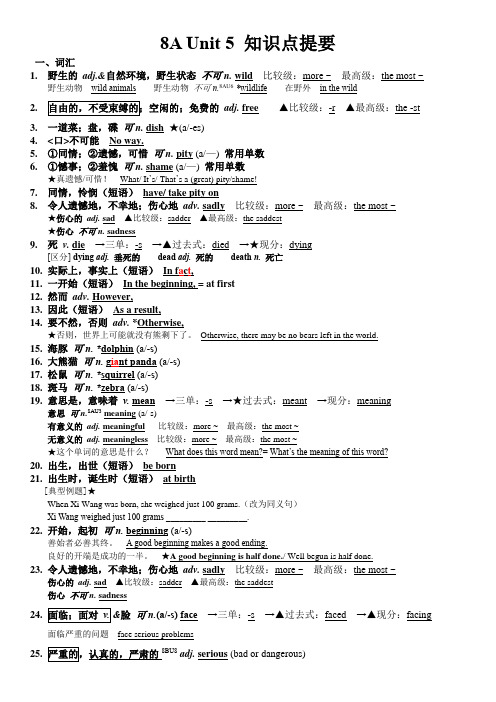
8A Unit 5 知识点提要一、词汇1.野生的adj.&自然环境,野生状态不可n. wild 比较级:more ~ 最高级:the most ~野生动物wild animals 野生动物不可n.8AU6 *wildlife 在野外in the wild2.adj. free▲比较级:-r ▲最高级:the -st3.一道菜;盘,碟可n. dish ★(a/-es)4.<口>不可能No way.5.①同情;②遗憾,可惜可n. pity (a/—) 常用单数6.①憾事;②羞愧可n. shame (a/—) 常用单数★真遗憾/可惜!What/ It’s/ That’s a (great) pity/shame!7.同情,怜悯(短语)have/ take pity on8.令人遗憾地,不幸地;伤心地adv. sadly 比较级:more ~ 最高级:the most ~★伤心的adj. sad ▲比较级:sadder ▲最高级:the saddest★伤心不可n. sadness9.死v. die→三单:-s →▲过去式:died →★现分:dying[区分] dying adj.垂死的dead adj.死的death n.死亡10.实际上,事实上(短语)In f a c t,11.一开始(短语)In the beginning, = at first12.然而adv. However,13.因此(短语)As a result,14.要不然,否则adv. *Otherwise,★否则,世界上可能就没有熊剩下了。
Otherwise, there may be no bears left in the world.15.海豚可n. *dolphin (a/-s)16.大熊猫可n. g ia nt panda (a/-s)17.松鼠可n. *squirrel (a/-s)18.斑马可n. *zebra (a/-s)19.意思是,意味着v. mean→三单:-s →★过去式:meant →现分:meaning意思可n.8AU3 meaning (a/-s)有意义的adj. meaningful比较级:more ~ 最高级:the most ~无意义的adj. meaningless比较级:more ~ 最高级:the most ~★这个单词的意思是什么?What does this word mean?= What’s the meaning of this word?20.出生,出世(短语)be born21.出生时,诞生时(短语)at birth[典型例题]★When Xi Wang was born, she weighed just 100 grams.(改为同义句)Xi Wang weighed just 100 grams _________ _________.22.开始,起初可n. beginning (a/-s)善始者必善其终。
Unit5知识点讲解牛津译林版英语八年级上册

八上第五单元知识点讲解1.知识目标:学生能够掌握第五单元的短语和词汇。
2.技能目标:学生能够掌握情态动词may的用法。
3.情感目标:学生能够养成保护野生动物的意识。
1.情态动词may的用法。
ic&Wele to the unit知识点1.Would you like to live in the wild,Eddie?你想住在野外吗?【用法详解】(1)wild表示“自然环境,野生状态”in the wild表示“在野外”。
(2)wild还可以表示“野生的” 例如:wild animals。
Eg.1.Can the baby pandas live in the wild on their own?熊猫宝宝能够独自在野外生存吗?2.In those days we often went to dig for wild vegetables.那时候我们常常出去挖野菜。
【典例讲解】1.If animals stay in the ____ (野外),they will be free.2.I don't think the animals should be kept in the zoo,but if they live in the _______, we have no chance to see them.3.它们在野外露营。
(翻译为英文)_______________________________________________________________________________ ____知识点2.So could you please not eat them?因此请你不要吃它们好吗?【用法详解】Can/Could you please.?此句型用来表示请求别人做某事,意思是“请你……,好吗?”。
could 是can的过去式,但在本句型中并不表示时间上的区别,而只是语气上的不同。
Unit5Weletotheunit知识点讲义牛津译林版英语八年级上册
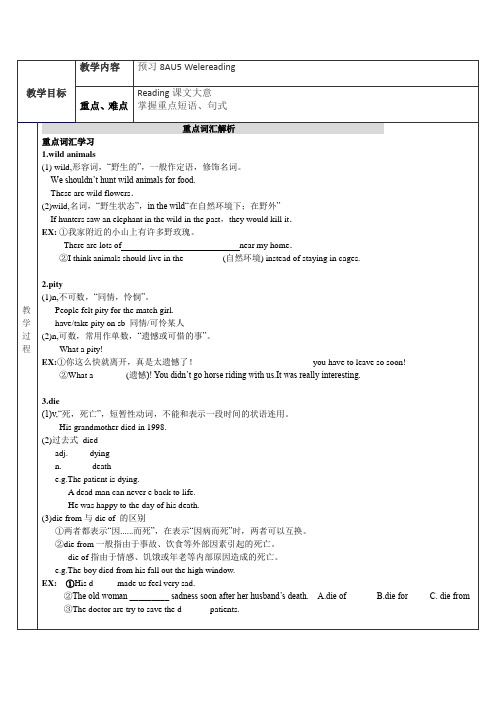
(2)n,可数,常用作单数,“遗憾或可惜的事”。
What a pity!
EX:①你这么快就离开,真是太遗憾了!_______________________ you have to leave so soon!
②What a _______(遗憾)! You didn’t go horse riding with us.It was really interesting.
③The doctor are try to save the d______ patients.
4.beginning
(1)n,“开始,起初”,反义词end.
in the beginning =at first“起初,开始”,反义词组at last
at the beginning of“在......的开始,在......的开头部分”,反义词组at the end of
教学目标
教学内容
预习8AU5 Welereading
重点、难点
Reading课文大意
掌握重点短语、句式
教学过程
重点词汇解析
重点词汇学习
1.wild animals
(1) wild,形容词,“野生的”,一般作定语,修饰名词。
We shouldn’t hunt wild animals for food.
e.g. My mother began to cook after she got home.
EX:①刚上课时,王老师给我们讲了一个故事。
________________________ the class,Mr Wang told us a story.
②这是她第一次为她的父母做饭。
- 1、下载文档前请自行甄别文档内容的完整性,平台不提供额外的编辑、内容补充、找答案等附加服务。
- 2、"仅部分预览"的文档,不可在线预览部分如存在完整性等问题,可反馈申请退款(可完整预览的文档不适用该条件!)。
- 3、如文档侵犯您的权益,请联系客服反馈,我们会尽快为您处理(人工客服工作时间:9:00-18:30)。
8A Unit 5 知识点1. Would you like to live in the wild,Eddie?1)would like to do sth.=want to do sth.但语气更加委婉2)wild adj.野生的/n.自然环境wild life/animals 野外生活/野生动物wildly adv.in the wild处于野生状态The children are wild with joy.欣喜若狂Fewer than a thousand giant pandas still live in the wild.翻译:花园里长了一些野花。
2. Please have pity on them.1)please可引导祈使句,后面加动词原形2)pity n.怜悯;同情;遗憾;可惜(have/take pity on)v.同情;怜悯The old lady often takes pity on small animals.那位老太太常常怜悯小动物。
I pity anyone who has to feed a family on such a low income.我同情任何需要以如此微薄的收入养活全家的人。
It's a pity that you can't come to the party.你不能来参加这次聚会,真可惜。
What a pity!真遗憾,可惜!3. I may die without them.1)die v.die out 消失; 灭绝; 逐渐消失; 灭亡die off 死去; 相继死去die of(内因)/from(外因)死于.. be dying for 渴望Sadly, both he and my mother died of cancer.I'm dying for a breath of fresh air.2)dead adj.死了的death n.死亡dying垂死的Car accidents caused many deaths.车祸造成很多人死亡。
He has been dead for two years.他已死了两年。
The little girl cried when she saw her dying cat.看到快死的小猫,小女孩哭了。
例题:用die,dead,dying,death填空①His grmadma_______of an illness last week. ①He is afraid he is_______.①His father has been_______for three years.①The_______of his mother was sudden.4. At four months old,she weighed about eight kilograms and started to go outside for the first time.1)此处的at four months old表示四个月大的时候,at表示具体的年纪可以用at the age of。
2)weigh v.衡量;称(重量)A full-grown elephant can weigh over 6,000 kilograms. 一头成年大象能重达六千多公斤。
3)for the first time在句中只能作状语,the first time可作表语和主语I went there for the first time.(状语) The first time i saw the film was last month.(主语)It is the first time I drink wine.(表语)for the first time 首次;第一次。
表示有生以来或一段时间内第一次做某事,在句中一般单独作状语。
The two girl students talked for the first time at the beginning of the term.两位女生开学初首次交谈。
the first time 首次;第一次。
常引导时间状语从句,其重点不是讲第一次做什么,而是说明另一动作或情况;也可以作表语,强调到说话为止某一情况或动作的次数。
I knew we would be good friends the first time I met her.第一次见到她,我就知道我们会成为好朋友。
This is the first time I have been to the Great Wall.这是我第一次去长城。
5. Sadly,giant pandas face serious problems in the wild.1)face v.面临,面对;面向;朝face sth./be faced with面对face to face with面对面They stood facing each other.面对面2)face n. 表面;脸;表情She had a beautiful face.They don't want a war, but they don't want to lose face.丢脸3)serious adj.严重的be serious about认真对待..../take....seriously 翻译:我们必须学会如何面对现实。
例题:Many_______diseases are carried by insects.A.heavyB.sickC.thickD.serious6. Giant pandas are now in danger.1)danger n. 危险;危险物(或人);威胁in danger处于危险中Violent criminals like that are dangers to society.那种暴力罪犯对社会是一种危害。
2)dangerous adj.危险的;不安全的It is dangerous to walk on thin ice in a lake.在湖中薄冰上行走是很危险的。
3)endangered adj. 濒于灭绝的We should do our best to save endangered species. 我们应该竭尽全力挽救濒于灭绝的生物。
7. Also,giant pandas live mainly on a special kind of bamboo.1)live on靠... 过活;以... 为主食;继续存在I had to live on bread and water when I was a student. 我上大学时只能靠粗茶淡饭过活。
2)mainly adv.主要地;大部分地The story is based mainly on tradition. 这故事主要来自传说。
8. I think everybody should act to protect wild animals.1)act n.行为;行动;法案;(戏剧、歌剧等的)一幕;假装v.行动;举止;假装;表演;扮演;充当;有效果They still act like college kids.他们的举止还有很浓的学生气。
This act had to get a strong support from them.这个行动必须得到他们的大力支持。
2)action n.行为;活动;措施;效用;交战;情节;事件;姿态;起诉;机能The medicine will not take action until two hours later.这药在两小时後才会起作用。
action与act区别:action常指持续,复杂的动作,而act则是短暂,简单的动作。
如有人倒在地上,扶他起来,是act,若不但扶他起来,还帮他叫车,送他到家,那是action;3)protect v.保护;投保He raised his arm to protect his child from hurt.他伸出手去,保护他的孩子免受伤害。
例题:①_______(action)are more important than words.①We should quickly take actions_______(save)the child’s life.9. If we do nothing,soon there may be none left!no one,nothing,none区别1)none可与of连用;谓语动词用单或复数;具体指什么人或物;一般用来回答how many +n,how much +n及含any+n引起的疑问句。
请看:None of us have/has seen him. —How many students are there in the room? —None.—Is there any water in the thermos? —None.—How much money do you have on you? —None.2)nothing指物;谓语用单数;一般用来回答含anything的一般问句及what引起的特殊问句。
—What is in the box? —Nothing. —Is there anything in the sky? —Nothing.—Can you see anything without glasses? —Nothing3)no one= nobody 只指人,“没有人”,不能指物,语气比none强,后面不能接of 构成的短语。
no one作主语时,谓语动词只能用单数。
No one / Nobody likes a person with bad manners. 没有人喜欢不讲礼貌的人。
4)①- How much water is there in the bottle? - None.②- What's in your hand? - Nothing.③- Who will go to the party? - No one/ Nobody.④-Did any one of the passengers get injured in the accident? -No, none was injured.⑤- Do you have anything else to say for yourself? - No, nothing else.⑥- Did anyone want to attend the meeting? - No, no one/ nobody wanted to.10. lose living areas1)lose v.失去,错过lose one’s life失去生命He lost his life in the war. 他在战争中丧生。
